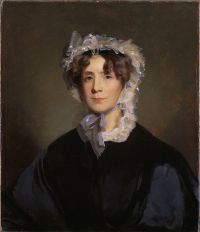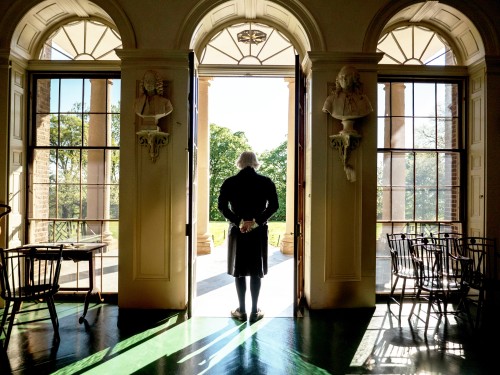 The burden of maintaining Monticello's gracious level of hospitality fell to the women of the Jefferson family and the talented slaves they supervised. Beginning with Jefferson's wife, Martha Wayles Skelton Jefferson, three generations of women managed the Monticello household. In addition to overseeing the preparation and service of meals, they also directed other domestic activities such as dairying; salting, curing, and smoking meats; and brewing and bottling beer. During one month in 1772, for example, Martha Jefferson recorded in her account book that she opened a barrel of flour; broke two loaves of sugar; had seven ducks, one lamb, and one pig killed; bought six pounds of coffee and eleven pounds of butter; and supervised the brewing of one cask (fifteen gallons) of beer. Jefferson valued his wife's managerial ability, writing "the order and economy of the house are as honourable to the mistress as those of the farm to the master, and if either be neglected, ruin follows."
The burden of maintaining Monticello's gracious level of hospitality fell to the women of the Jefferson family and the talented slaves they supervised. Beginning with Jefferson's wife, Martha Wayles Skelton Jefferson, three generations of women managed the Monticello household. In addition to overseeing the preparation and service of meals, they also directed other domestic activities such as dairying; salting, curing, and smoking meats; and brewing and bottling beer. During one month in 1772, for example, Martha Jefferson recorded in her account book that she opened a barrel of flour; broke two loaves of sugar; had seven ducks, one lamb, and one pig killed; bought six pounds of coffee and eleven pounds of butter; and supervised the brewing of one cask (fifteen gallons) of beer. Jefferson valued his wife's managerial ability, writing "the order and economy of the house are as honourable to the mistress as those of the farm to the master, and if either be neglected, ruin follows."
"Seated on My Throne in the Kitchen"
 Sadly, Mrs. Jefferson died in 1782, when her oldest daughter Martha (who later married Thomas Mann Randolph) was only ten years old. Consequently, Martha Randolph (shown at right) did not have the benefit of her mother's expertise in learning how to manage the plantation, and the school she attended in Paris did not provide adequate education in practical matters of "housewifery." As a young wife and mother, however, Martha Randolph learned these skills quickly and could proudly announce to her father, "I have wrought an entire reformation on...my household. Nothing comes in or goes out without my knowledge and I believe there is as little waste as possible."
Sadly, Mrs. Jefferson died in 1782, when her oldest daughter Martha (who later married Thomas Mann Randolph) was only ten years old. Consequently, Martha Randolph (shown at right) did not have the benefit of her mother's expertise in learning how to manage the plantation, and the school she attended in Paris did not provide adequate education in practical matters of "housewifery." As a young wife and mother, however, Martha Randolph learned these skills quickly and could proudly announce to her father, "I have wrought an entire reformation on...my household. Nothing comes in or goes out without my knowledge and I believe there is as little waste as possible."
To assure that her daughters were better prepared than she had been, Martha Randolph began training them early and required each to take a one-month turn as "housekeeper." During this time they were responsible for attending to guests, directing slaves, and "carrying the keys" to the storage and wine cellars. One of Jefferson's granddaughters described herself in this role as "seated on my throne in the kitchen with a cookery book in my hand," and another lamented the fact that she had no time to write letters because "to think of anything but beef and pudding is out of the question."
